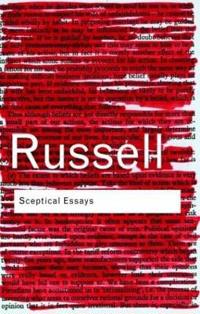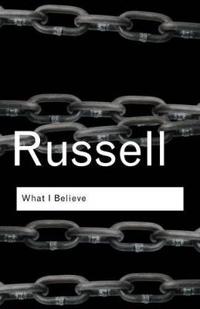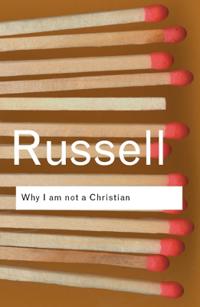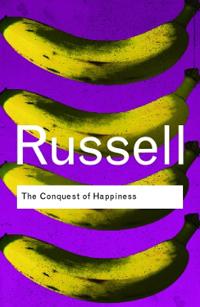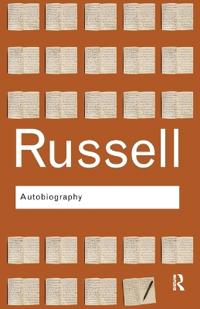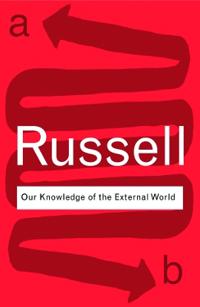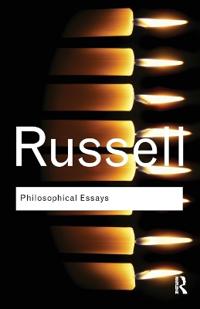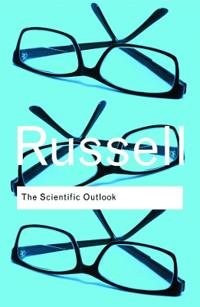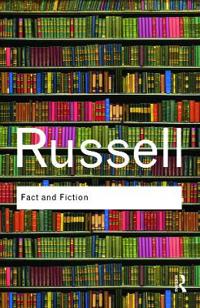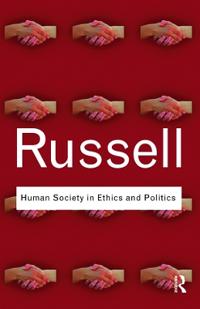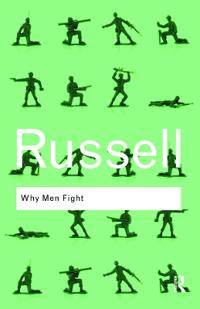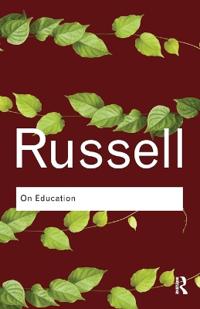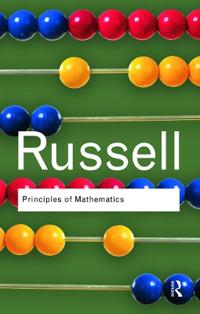Power (Häftad)
avBertrand Russell
ISBN: 9780415325073 - UTGIVEN: 200402The key to human nature that Marx found in wealth and Freud in sex, Bertrand Russell finds in power. Power, he argues, is man's ultimate goal, and is, in its many guises, the single most important element in the development of any society. Writting in the late 1930s when Europe was being torn apart [...]
Sceptical Essays (Häftad)
avBertrand Russell
ISBN: 9780415325080 - UTGIVEN: 200402'These propositions may seem mild, yet, if accepted, they would absolutely revolutionize human life.' With these words Bertrand Russell introduces what is indeed a revolutionary book. Taking as his starting-point the irrationality of the world, he offers by contrast something 'wildly paradoxical and[...]
What I Believe (Häftad)
avBertrand Russell
ISBN: 9780415325097 - UTGIVEN: 200402Along with Why I Am Not a Christian, this essay must rank as the most articulate example of Russell's famed atheism. It is also one of the most notorious. Used as evidence in a 1940 court case in which Russell was declared unfit to teach college-level philosophy, What I Believe was to become one of [...]
Why I am Not a Christian (Häftad)
avBertrand Russell
ISBN: 9780415325103 - UTGIVEN: 200402While its tone is playful and frivolous, this book poses tough questions over the nature of religion and belief. Religion provides comfortable responses to the questions that have always beset humankind - why are we here, what is the point of being alive, how ought we to behave? Russell snatches tha[...]
The Conquest of Happiness (Storpocket)
avBertrand Russell
ISBN: 9780415378475 - UTGIVEN: 200602"The Conquest of Happiness" is Bertrand Russell's recipe for good living. First published in 1930, it pre-dates the current obsession with self-help by decades. Leading the reader step by step through the causes of unhappiness and the personal choices, compromises and sacrifices that (may) lead to t[...]
An Outline Of Philosophy (Storpocket)
avBertrand Russell
ISBN: 9780415473453 - UTGIVEN: 2009-02In his controversial book "An Outline of Philosophy", first published in 1927, Bertrand Russell argues that humanity demands consideration solely as the instrument by which we acquire knowledge of the universe. From our inner-world to the outer-world, from our physical world to the universe, his arg[...]
Mortals and Others (Pocket)
avBertrand Russell
ISBN: 9780415473514 - UTGIVEN: 2009-03-01Between 1931 and 1935, Bertrand Russell contributed some 156 essays to the literary pages of the American newspaper "New York American". This title presents a collection of essays that brings together the very best of Russell's many contributions to the "New York American".[...]
Unpopular Essays (Pocket)
avBertrand Russell
ISBN: 9780415473705 - UTGIVEN: 2009-02-16Characteristic and self-revealing, this book was written to combat the growth in Dogmatism.
Autobiography (Storpocket)
avBertrand Russell
ISBN: 9780415473736 - UTGIVEN: 200909Bertrand Russell remains one of the greatest philosophers and most complex and controversial figures of the twentieth century. Here, in this frank, humorous and decidedly charming autobiography, Russell offers readers the story of his life -- introducing the people, events and influences that shaped[...]
Our Knowledge of the External World (Storpocket)
avBertrand Russell
ISBN: 9780415473774 - UTGIVEN: 200902"Our Knowledge of the External World" is a compilation of lectures Bertrand Russell delivered in the US in which he questions the very relevance and legitimacy of philosophy. In it he investigates the relationship between 'individual' and 'scientific' knowledge and questions the means in which we ha[...]
Abc Of Relativity (Pocket)
avBertrand Russell
ISBN: 9780415473828 - UTGIVEN: 2009-02-20An introductory guide to Einstein's theory of Relativity to a general readership.
Human Knowledge (Pocket)
avBertrand Russell
ISBN: 9780415474443 - UTGIVEN: 2009-03-01How do we know what we 'know'? How did we - as individuals and as a society - come to accept certain knowledge as fact? This title questions the reliability of our assumptions on knowledge. It investigates the relationship between 'individual' and 'scientific' knowledge.[...]
Philosophical Essays (Storpocket)
avBertrand Russell
ISBN: 9780415474498 - UTGIVEN: 2009-02First published in 1910, "Philosophical Essays" is one of Bertrand Russell's earliest works and marks an important period in the evolution of thought of one of the world's most influential thinkers. This selection of seven essays displays Russell's incisiveness and brilliance of exposition in the ex[...]
The Philosophy Of Logical Atomism (Pocket)
avBertrand Russell
ISBN: 9780415474610 - UTGIVEN: 2009-09-01Presents an introduction to logical atomism and its application to ontology and epistemology.
The Scientific Outlook (Storpocket)
avBertrand Russell
ISBN: 9780415474627 - UTGIVEN: 200902According to Bertrand Russell, science is knowledge; that which seeks general laws connecting a number of particular facts. It is, he argues, far superior to art, where much of the knowledge is intangible and assumed. In "The Scientific Outlook," Russell delivers one of his most important works, exp[...]
Marriage and Morals (Pocket)
avBertrand Russell
ISBN: 9780415482882 - UTGIVEN: 2009-03-01Offers a cross-cultural examination of individual, familial and societal attitudes towards sex and marriage. Exploring the codes by which we live our sexual lives and conventional morality, this title sets out a fresh morality, shaped and influenced by dramatic changes in society such as the emancip[...]
Fact and Fiction (Storpocket)
avBertrand Russell
ISBN: 9780415487320 - UTGIVEN: 2009-09First published in 1961, Fact and Fiction is a collection of Bertrand Russell's essays that reflect on the books and writings that influenced his life, including fiction, essays on politics and education, divertissements and parables. Also broaching on the highly controversial issues of war and peac[...]
Authority And The Individual (Pocket)
avBertrand Russell
ISBN: 9780415487337 - UTGIVEN: 2009-09-01Examines Ancient Greek philosophy, the French Revolution and the modern welfare state.
Common Sense and Nuclear Warfare (Övrig)
avBertrand Russell
ISBN: 9780415487344 - UTGIVEN: 2009-09-01Written at the height of the Cold War in 1959, Common Sense and Nuclear Warfare was published in an effort 'to prevent the catastrophe which would result from a large scale H-bomb war'. Bertrand Russell's staunch anti-war stance is made very clear in this highly controversial text, which outlines hi[...]
Education and the Social Order (Övrig)
avBertrand Russell
ISBN: 9780415487351 - UTGIVEN: 2009-09-01Bertrand Russell was renowned for his provocative views on education. Considered an educational innovator, Russell attempted to create the perfect learning institution. Despite the failure of this practical vision, it did not stop him from continuing to strive towards inventing and arguing for a sys[...]
Prospects of Industrial Civilization, The (Övrig)
avBertrand Russell
ISBN: 9780415487368 - UTGIVEN: 2009-08-27First published in 1923, The Prospects of Industrial Civilization is considered the most ambitious of Bertrand Russell's works on modern society. It offers a rare glimpse into often-ignored subtleties of his political thought and in it he argues that industrialism is a threat to human freedom, since[...]
Human Society in Ethics and Politics (Storpocket)
avBertrand Russell
ISBN: 9780415487375 - UTGIVEN: 2009-09First published in 1954, Human Society in Ethics and Politics is Bertrand Russell's last full account of his ethical and political positions relating to both politics and religion. Ethics, he argues, are necessary to man because of the conflict between intelligence and impulse -- if one were without[...]
Why Men Fight (Storpocket)
avBertrand Russell
ISBN: 9780415487382 - UTGIVEN: 200909Also published under the title of Principals of Social Reconstruction, and written in response to the devastation of World War I, Why Men Fight lays out Bertrand Russell's ideas on war, pacifism, reason, impulse, and personal liberty. He argues that the individualistic approach of traditional libera[...]
On Education (Pocket)
avBertrand Russell
ISBN: 9780415487405 - UTGIVEN: 2009-08Bertrand Russell is considered to be one of the most significant educational innovators of his time. In this influential and controversial work, Russell calls for an education that would liberate the child from unthinking obedience to parental and religious authority. He argues that if the basis of [...]
Principles of Mathematics (Storpocket)
avBertrand Russell
ISBN: 9780415487412 - UTGIVEN: 200908First published in 1903, Principles of Mathematics was Bertrand Russell's first major work in print. It was this title which saw him begin his ascent towards eminence. In this groundbreaking and important work, Bertrand Russell argues that mathematics and logic are, in fact, identical and what is co[...]


